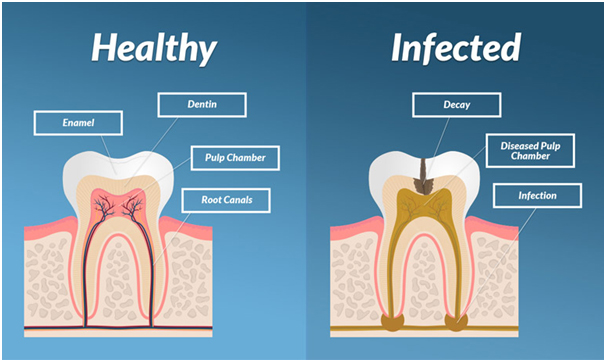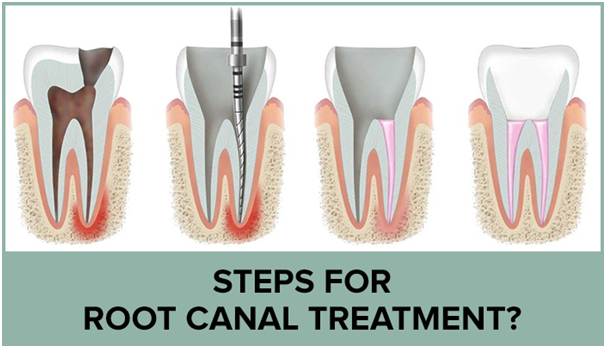Dentists propose Root Canal Treatment, often called endodontic treatment, to remove the diseased pulp and preserve damaged or infected teeth. It assists in avoiding the removal of teeth if they become damaged or diseased.
Because pulp includes blood vessels and nerves, it is what keeps your tooth alive. When a dentist detects an infection in the pulp, they may offer Root Canal Treatment to prevent re-infection in the future. The following are the many processes involved in root canal therapy that you might anticipate at your next dental visit.

How is Root Canal Treatment done?
The RCT technique is divided into four distinct stages.
Step 1: Diagnosis of the Infected Pulp
Your dentist will begin by inspecting your teeth. Then, one or two X-rays may be taken to determine the amount of inflammation and tooth decay. Additionally, they may conduct a sensitivity test to see if you suffer discomfort or pain when your biting surface is exposed to sweet, cold, or hot stimuli.
Step 2: Cleaning
Local anaesthesia is administered to the afflicted area, and tiny holes are drilled into the tooth. After extracting the diseased pulp, the tooth is cleansed.
Step 3: Canal sealing
After cleaning and disinfecting the canal, the doctor will shape this hollow portion of the tooth. This space is filled with a tiny rubber-like substance and sealed with adhesive cement.
Step 4: Crowning
A dental crown is convenient, detachable, and resistant to all forms of pressure.

What will happen if you don’t get a Root Canal Treatment?
- If the pain subsides, this does not signify that the tooth has healed; instead, it shows that the nerves within the tooth have died and the infection has multiplied.
- Infectious bacteria may infiltrate the gum and jaw tissues, resulting in a pus-filled abscess. This may result in a life-threatening illness such as heart disease or stroke.
Frequently asked Questions
Is It Possible For An Infected Tooth To Heal On Its Own?
No, an infected tooth is incapable of self-healing. Indeed, the infection has the potential to spread to other regions of your jaw, resulting in severe discomfort. Medications or root canal therapy are required to treat an infected tooth. To schedule an RCT, contact your local Luxe Dental Clinic.
Are Root Canal Procedures Extremely Painful?
No, root canal therapy is completely painless. Prior to beginning root canal therapy, a dentist will numb the affected region using local anaesthesia, guaranteeing a painless procedure.
How Long Does It Take For A Wound To Heal?
The treated tooth will recover within a few days after the root canal therapy is done. Patients may have some discomfort upon recovering from anaesthesia; however, this is expected to subside within a few days due to the medicine.
Is it possible to complete an RCT in a single day?
The majority of root canal treatments may be done effectively in a single day by a dentist. In severe infection or a back tooth, a dentist may schedule a 2-3 day visit to complete the procedure.
Care after treatment for root canal treatment?
Avoid applying pressure on the teeth. Without a crown, the tooth is exposed; consequently, applying pressure to the tooth might cause injury. Avoid eating hard or crunchy foods and instead chew soft foods until complete repair occurs. Brush with caution. Avoid being overly rough while brushing. Have a dental crown to preserve your tooth from additional harm as soon as feasible. Consult your dentist if you are experiencing complications or significant discomfort.





